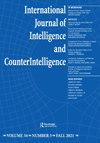Democratization of Intelligence: Demilitarizing the Greek Intelligence Service after the Junta
IF 0.5
Q4 INTERNATIONAL RELATIONS
International Journal of Intelligence and Counterintelligence
Pub Date : 2023-11-02
DOI:10.1080/08850607.2023.2261824
引用次数: 0
Abstract
Military dictatorships critically rely on the armed forces and intelligence agencies for the maintenance of their regime. They strengthen these through the allocation of substantial staff and personal resources. We know little about the behavior of intelligence and security services in the transition from authoritarianism to democracy. This article examines the Greek Intelligence Service (KYP) and, since 1986, the National Intelligence Service as its successor. A principal ingredient for the democratic embedment of the service was a break with this dictatorial past and, consequently, its demilitarization. This article shows that the de facto demilitarization of the service was a protracted process that was largely independent from the de jure formal demilitarization in 1986. It both preceded and lagged the legislative decision in 1986. This article particularly focusses on personnel policies aimed at distancing the service from its former ties to the junta regime (1967–1974), the “old KYP.” Its methodological contribution lies in its reliance on original, oral history interviews with former employees of the service and in its systematic analysis of newspaper publications for research on the KYP. I argue and show that internal organizational factors, most notably professionalization and shifting responsibilities, rather than external factors such as party politics or a prodemocratic ideological vision, are the key explanations for a change in the otherwise persistent military staffing of the intelligence service.情报民主化:军政府后希腊情报机构的非军事化
军事独裁政权严重依赖武装部队和情报机构来维持其政权。它们通过分配大量工作人员和个人资源来加强这些资源。我们对情报和安全部门在从威权主义向民主过渡过程中的行为知之甚少。本文考察了希腊情报局(KYP),以及自1986年以来作为其继任者的国家情报局(National Intelligence Service)。将军种民主嵌入的一个主要因素是与这种独裁的过去决裂,从而使其非军事化。这篇文章表明,军事服务事实上的非军事化是一个长期的过程,在很大程度上独立于1986年法律上的正式非军事化。它既早于1986年的立法决定,又落后于1986年的立法决定。本文特别关注人事政策,旨在使军种与军政府政权(1967-1974),即“旧KYP”保持距离。它在方法论上的贡献在于,它依赖于对该服务前雇员的原始口述历史采访,并对报纸出版物进行系统分析,以研究KYP。我认为并表明,内部组织因素,最明显的是专业化和责任转移,而不是外部因素,如政党政治或亲民主的意识形态愿景,是情报部门持续的军事人员配置变化的关键解释。
本文章由计算机程序翻译,如有差异,请以英文原文为准。
求助全文
约1分钟内获得全文
求助全文
来源期刊

International Journal of Intelligence and Counterintelligence
INTERNATIONAL RELATIONS-
CiteScore
1.00
自引率
22.20%
发文量
102
 求助内容:
求助内容: 应助结果提醒方式:
应助结果提醒方式:


